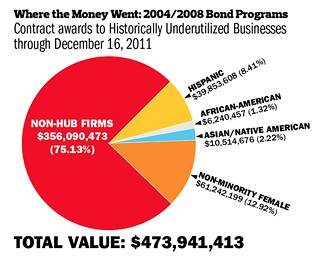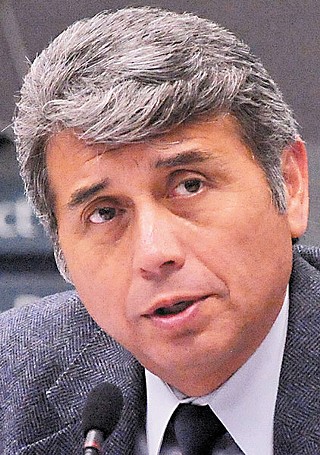AISD's Underutilized Business
The district thinks its program for minority- and women-owned firms works, but contractors say otherwise
By Richard Whittaker, Fri., May 24, 2013
As staff and community members worked on the most recent Austin ISD bond package, their mantra was equity: All schools around the city must have access to the same resources, no matter the race, gender, or wealth of the students. Now that the district plans to spend $490 million in bond money over the next few years, a new equity issue is raising its head: how to spread those construction dollars just as equitably among contractors and vendors.
The district calls them HUBs – historically underutilized businesses. Historically, women- and minority-owned firms have been excluded from big contracts. It's a vicious circle: For decades, government entities in Texas would not do business with them, so they couldn't grow big enough or have the right skill sets to apply for other contracts, so they wouldn't get other contracts. What started as simple racism has evolved into a business impasse. Compared to the city of Austin or Travis County, both of which have dedicated HUB offices, the district has an extremely limited program aimed at breaking that cycle. Firstly, it depends on an external consultant. Secondly, it only deals with contracts for projects paid for by the district's 2004 and 2008 bond elections. However, there is a move towards opening a dedicated office within the district, and extending the program beyond just construction and into every aspect of the district's purchasing.
At the AISD board meeting on May 7, trustees started to broach that possibility. The first step is to hold what is known as an equity or disparity study: External consultants compare the kind of work an entity has available to contract out, then they look at the available minority- and women-owned firms in the metropolitan area that can provide such services. Fortunately for the district, the city and Travis County are launching a yearlong equity study, to fine tune their own well-established programs. If the district can reach a decision by June 17, then it can join that study when it launches in August.
For AISD trustee Lori Moya, this is a golden opportunity. Without such a study, the district is legally prohibited from setting HUB participation goals. With it, not only will it know where it is falling short or providing sufficient opportunities, but she sees a real chance to appraise the whole process. A former member of the Community Bond Oversight Committee (CBOC) and a current member of the board's ad hoc HUB subcommittee, Moya sees plenty of room for improvement, especially in creating opportunities for HUB-certified businesses to grow and mature. Currently, she said, "We don't have the bandwidth" to train firms in simple issues like bid-writing skills, "and that's a hindrance to some folks to participate in the bidding process. Or they don't have the ability to hire an attorney or a consultant to write one for them, or they're just intimidated by the whole giant process."

As AISD's assistant director of purchasing, Jim Sessions deals with day-to-day contracts for consumables, rather than large-scale construction issues. That means his office is not technically part of the existing HUB program. It has HUB participation but, he said, "We don't brag about it, because there is not a request for a reporting mechanism." As a former employee of the Texas Department of Transportation and Sam Houston State University, he said, "I'm familiar with a world where everyone had a HUB program. ... So this is a little odd to me to have Austin have a program that's oriented solely to construction."
Where's the Outreach?
According to a February 2012 report, of the $478 million in contracts awarded through Dec. 16, 2011, from the 2004 and 2008 bonds, $118 million – just under a quarter – had been awarded to HUBs. The single biggest beneficiaries had been non-minority women-owned firms, receiving a total of $61 million (12.9%) of all contracts. Still, not all contracts are created equal. The bulk of that HUB money has been spent on construction services. However that's the area with the lowest minority involvement, with only 20.2% HUB participation. The numbers look more equitable in professional services, such as surveyors and architects, where 35.9% of all dollars spent went to HUB firms.
At the moment, the district's HUB consultancy contract is held by DM Dukes and Associates, owned by Austin Democratic state Rep. Dawnna Dukes. The firm was awarded the $253,000, one-year contract in 2012 after the previous contractor, Austin-based CMPI, did not rebid for the project. Dukes' firm beat out three other bidding entities: Entermedia Group, Uniquest International, and the Minority Contractors Association Coalition. The consultant's role, said Lawrence Fryer, the district's chief operations officer, "is to increase openness on construction-related opportunities." Their purpose is two-fold. First, to increase the number of HUB firms applying for contracts by outreach to contractors, and increasing partnerships between non-minority contractors and eligible subcontractors. Secondly, the firm evaluates both the quality and the end results of the district's HUB efforts, and reports on a monthly basis to the Citizens Bond Oversight Committee. The administration's job is to make sure that Dukes' firm isn't producing reports that rubber-stamp their own work. Fryer said, "OK, you contacted 30. Did five of them get a contract? They're not just out there self-reporting. There is an end where you can actually attach metrics about the end result of their outreach efforts."
The jury is out on how successful Dukes' firm has been as the new contractor, for two good reasons. Firstly, they have been dealing solely with outreach on new projects, including the Performing Arts Center, so no new construction contracts have been signed yet. All the firm has been able to report on so far is its process. Secondly, while the firm has been delivering regular updates to the CBOC, they won't deliver a full report to the district until October. Until then, outgoing AISD Facilities Director Paul Turner described any attempt to match CMPI's reports with what they have delivered to the CBOC as an "apples to oranges" comparison.
Sessions summed up the district's HUB policies in four core tasks: packaging projects to match the availability and capability of HUB firms; ensuring that prime and sub-prime contractors keep to the construction requirements; maintaining a HUB database; and assessing the district's mentor-protege program. He said, "I think that's what they had in mind when they engaged DM Dukes and Associates." However, when he looks at what the district required, he said, "I don't read a whole lot about, 'let's get out and hustle and meet with the various chambers and the various construction trade groups, and let's identify what their concerns are, and let's put together some solutions.'"
The general advice from Dukes' staff to the district has been to create more opportunities for subcontractors, or to divide large contracts into smaller projects, making them more accessible to smaller firms. However, there are limitations on how many contracts HUB-qualified business owners can or will apply for. For example, during the bidding phase for the new PAC, DM Dukes and Associates looked for minority-owned firms to work on erosion control projects: Locally, there were five qualified Hispanic-owned firms, three African-American, and six female, but none owned and run by Asian or Native American management. That's a challenge in construction, but it's a near insurmountable issue if the district decides to extend the program into procurement, Sessions said. "There're only so many companies that manufacture school buses or cafeteria tables." Sometimes the district has no choice at all in who they hire, especially when the state puts its thumb on the spending scale. Texas requires ISDs to use major corporations like Pearson Interactive for testing, and there simply is no HUB alternative. AISD Board President Vince Torres argues that that skews district spending before the first dollar is spent. He also sees limitations to Dukes' wisdom about slicing the remaining pie into more manageable chunks. He said, "How far do you chop this up? After a while, a finely sliced program has excess project-management costs."
Even with those limitations, the district has taken steps to toughen up on its HUB program. In 2011, the CBOC made a list of recommendations, tightening up disclosure statements so that contractors must list all subcontractors and provide feedback for subcontractors. Now, Fryer said, "If a sub makes a bid to a prime, they get feedback, rather than never hearing again what the outcome was." While he argues that the district has made improvements, if the district does sign up for the study, Fryer said, "It allows us to take that next step forward."
Torres said he is committed to having a robust HUB program, adding, "We need to have it as an element of any business operation. ... I was pretty adamant, I don't just want lip service." As such, he backs participation in the city/county equity study, but is lukewarm on the need to replace the consultant with a full program. Like Moya, he is a CBOC veteran, and he argues that the district is doing good work without a full HUB office. He said, "I'm not convinced that the city's program has done what they wanted it to do."
But do minority businesses think the district is doing any better? Ask U.S. Hispanic Contractors Association of Austin Chair Frank Fuentes and he says, "The short answer is no. The longer version of the answer is that it could be better." His first concern is about how the district presents its data. The city and state break their HUB contractors into four categories: construction, professional firms (those that require licenses such as architects and engineers), nonprofessional consultants (such as PR firms), and commodities services. While the city provides HUB participation and dollar amounts in each category, AISD lumps them all into one figure. Fuentes said, "You do not have actual numbers that reflect what has occurred."
For Fuentes, a district equity study isn't just desirable: It's essential, and he's been pushing for one for over a decade. "They have a brilliant opportunity to partner with the city and Travis County," he said. "They miss the boat now, and they miss it for another 10 years, unless they do one themselves, and that would be too costly."
No Targets, No Penalties
While Fuentes calls AISD's process "a program that operates on good faith, with nothing to back it up," Carmelo Macias, principal at surveyors Macias & Associates and head of the Austin Minority and Women Alliance, is much more blunt. "They don't have a program," he said. Without a formal program, the district has no targets, and therefore no penalties. "To not have a program at all in 2013 is shameful," he said. "Here in Austin, you need to have a program in order for taxing entities, be they AISD or anybody else, to have minority participation."
Unlike construction contracts, bids by professional firms like the members of his organization are not handed out on cost, but on experience. Macias said, "In our industry, we're selected by qualifications and then we negotiate a contract." How does he think the district is doing on minority involvement in this sector? "Poorly," he said. He argued that, while the demographics of the professional service providers reflect the broader demographics of the city, they are under-represented when it comes to winning AISD contracts. As for the work by Dukes and Associates, he said, "They're serious about increasing participation in AISD, but that doesn't necessarily make a program." He pointed to a recent analysis of contracts for the district's Performing Arts Center. Macias said, "Look at minority participation in terms of gender and in terms of race, and they are all extremely low." Out of the total projected cost, including construction, professional, nonprofessional, and commercial services, only 24.3% of spending has been forecast as going to HUBs. The lion's share of that goes to women-owned businesses (19%), followed by African-American (3.6%) and Hispanic (1.7%), with nothing for Asian or Native American firms. Even factoring in additional projected contracts, that HUB participation total is only projected to rise to 28.1% – well under the number of eligible local HUBs, Macias said: "If you add up the available firms in town, we're talking about 40 percent."
The CBOC has already voiced worries about the lack of HUB participation at the PAC. During their Feb. 5 update from Dukes and Associates, according to the minutes, members were concerned "that the HUB process is taking too long and the PAC will be complete before the HUB program is established and HUBs are fully engaged." More broadly, "Members expressed concern that HUBs in Austin do not trust the District's efforts due to past failed efforts to engage with HUBs."
However, there's a coda. While HUB programs are the norm in Travis County, and mandatory for state agencies and universities, AISD is not actually obligated to run one. Sessions described that as a symptom of the state's approach to school finance. He said, "The Legislature left it up to the local school boards, and therein you just see the unique nature of each community." The end result is that rural ISDs tend to think more about buying local than about HUB issues, but districts in the "Metro Eight" club of major Texas cities are patchy on HUB policies. For example, Arlington ISD Communications Coordinator Leslie Johnston said, "We have never set goals for HUB vendors." Similarly, San Antonio's Northside ISD uses an evaluation matrix that includes staffing and experience, but there are no extra points for being minority- or women-owned. Northside's Executive Director of Communications Pascual Gonzalez said, "It's just not something that we judge."
So in that context, should AISD be praised for the program it has? Fuentes said, "No, they don't get points for trying. They're spending too many dollars just to show that they're trying, and it's misleading, it's disingenuous."
However, three districts in the Metro Eight – Fort Worth, Houston, and Dallas – have full-fledged HUB offices. In fact, Fort Worth currently has two. There's the Historically Underutilized Business Program: Operated through the Purchasing Department, it focuses on day-to-day operations, such as instructional supplies and technology maintenance. External Communications Coordinator Clint Bond said, "I've been here for seven years, and we've had it that long." But there's a second program, dealing specifically with construction. In 2007, Fort Worth voters approved a $593.6 million bond package, including $551.9 million for new school construction, for what was dubbed the Capital Improvement Program. To ensure minority- and women-owned participation, the board of trustees opened a dedicated CIP HUB office and set a target that 25% of all fees paid would go to HUB firms. By October 2012, the actual figure paid out was 44%: Women-owned businesses led the way with 20% of the revenue, followed by Hispanic (13%), African-American (9%), and Asian-Indian (2%). Those numbers outpace AISD in all categories. Bond said, "Technically, we had two HUBs going at the same time," but now that the bulk of the construction spending is over, the CIP program is being folded into the existing office.
How the City Compares
While HUB programs are not the norm for school districts, Macias said there are plenty of entities running successful programs, not least the city of Austin. He called it "the best program in Central Texas. They're very careful in what they do, they avoid lawsuits from non-minority firms, and they protect the ordinance pretty well." While the city's program is far from perfect, he said, "If AISD wants to be successful in any way, they need to follow the model of the city of Austin."
The city has been running its HUB program – the Minority-Owned Business Enterprise/Women-Owned Business Enterprise, or MBE/WBE for short – since 1987. Veronica Briseño Lara, director of Small and Minority Business Resources, called it "basically an affirmative action program," and it applies to all projects, whether construction, purchasing, or services, above the city manager's spending authority of $56,000. And, she said, "It doesn't mean that city program doesn't apply to contracts under that threshold. It just means that's where we are involved in setting goals."
One of the department's core roles is in certifying MBE/WBE firms (in fact, they do such a good job that AISD uses the city vendor list for its own program). That's a 60-day process, and there are five staff members solely processing applications. Lara said, "We want to ensure that a company is not minority in name. We want to make sure that the owner is involved in day-to-day decisions." But the company still has to be able to do the job. "Say we're utilizing a hauling company. We'll look at the equipment that they have, to ensure it meets industry standards, and we're also looking at experience, résumés of the order, and references of previous work."
Possibly the most time-consuming part of the office's job is outreach. There are monthly networking sessions, as well as longstanding agreements with minority business associations. The core focus remains to increase not just the number of HUB firms hired, but the number of HUB firms capable of the scale of work on offer. The city has a bonding consultant whose job entails working with small firms to review their credit, so they can get the bonding required for major projects. Lara said, "Just a couple of weeks ago, we had a session for firms that have been getting certified in certain priority codes like HVAC, where we don't have a whole lot of firms pre-certified."
Communications Consultant Paul Saldaña, who has worked with both AISD and Fuentes' group, sees a gap between the city's systematic program and the district's more ad hoc process. For example, AISD was recently looking for bids to replace the roof at Pearce Middle School. They scheduled a pre-proposal conference – effectively a project briefing for contractors – for 10am on April 4. The email invitation went out at 4pm on April 3. For Saldaña, that shows a core lack of understanding of how HUB firms work. He said, "They're mom-and-pops, less than five employees, usually extended family members that work for the firms. They're on the job site at 5 o'clock in the morning and they don't get home 'til 10, 11 o'clock at night. Do you think they're really running home to check their email?"
Fryer called that "an anomaly." He said that Dukes and Associates has now been issued a full list of contracts due to be released this summer, "so that information can be passed to minority contractors, so they know what is coming up, rather than waiting for an announcement that an RFP [Request for Proposal] is about to be released."
The consensus is undoubtedly that the district has an opportunity to become much more aggressive and proactive on HUB issues. But there's a catch, and it's the same catch that drives every school district decision: money. If the district joins the city/county study, it will save roughly $1 million over holding its own independent study. But it will still cost some $400,000. And district bond counsel, public finance law firm Andrews Kurth, has informed staff that to participate they cannot use bond money or interest from bond payments, so that money will have to come out of general revenue spending – a sizeable expense at a time of short budgets. Then there's the cost of having Dukes and Associates perform a scope-of-work report, to examine how broad the scope of the equity study should be. The district will also have to retain an external consultant – potentially Dukes and Associates again – through the survey and until a final decision on a new HUB strategy is not just taken, but implemented. And then there's the cost of maintaining a HUB program. Lara's office has 24 employees, and if the district were to duplicate it, Fryer said, "It would have an impact on staffing and capacity."
Even if the district does enter the equity study, and starts to build a new HUB office, Moya is aware that not all expectations may be met. "Ideally, we could have the whole program," she said, "but the whole program including staff may be something that we can't afford right now." Yet she still sees true value in signing up for the study: "This is the best opportunity to maximize our dollars in order to have real HUB goals."
Got something to say on the subject? Send a letter to the editor.














